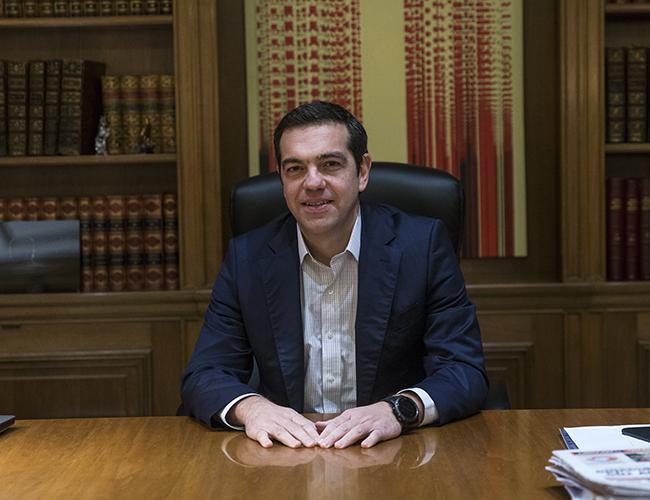
Greek Prime Minister Alexis Tsipras said on Dec. 6 that “coup plotters are not welcome in Greece,” ahead of Turkish President Recep Tayyip Erdoğan’s historic visit to the country on Dec. 7 and Dec. 8 upon an invitation by Greek President Prokopis Pavlopoulos.
“My stance on the issue has always been clear. Coup plotters are not welcome in Greece. We are continuing our cooperation with Turkey in terms of security and judiciary,” Tsipras told Turkey’s state-run Anadolu Agency.
Hours after the July 15, 2016 failed coup attempt in Turkey, eight soldiers fled to Greece’s Alexandroupoli in a Black Hawk army helicopter. The aircraft was returned the next day but the soldiers immediately requested asylum and stayed.
Greece’s Supreme Court on Jan. 26 ruled against an extradition request by Ankara, stating that the men would not get a fair trial in Turkey and that their lives would be at risk if they returned.
Meanwhile, a Greek court on Dec. 4 ordered the arrest of nine Turkish citizens pending trial for terrorism-related offences, including links to an outlawed militant group behind a series of suicide bombings in Turkey.
“I believe that the first visit by a Turkish president after decades will offer an important opportunity to take bold steps toward the future,” Tsipras said.
Also commenting on the migrant flows to Europe through Greece and Turkey, Tsipras said the accession process of Turkey to the European Union and Brussels-Ankara ties are “more important than ever.”
Turkey has fulfilled its commitments to the European Union over reducing the Aegean migrant flows, he said, referring to an EU-Turkey deal that had promised Turkish citizens visa-free travel in the bloc countries.
The 2016 deal now hangs by a thread due to the problems in relations.
Erdoğan visited Greece as prime minister in 2004 and 2010, but he will be the first Turkish head of state to visit Athens since Celal Bayar in 1952. He is also scheduled to visit Thrace in northern Greece, home to a large Muslim community.
Greece and Turkey were involved in a major dispute over a tiny Aegean island 1996, but tensions have eased since.
“Issues that concern the two countries will be on the agenda of talks - tensions in the Aegean Sea, the refugee crisis, economic relations with a focus on energy, trade and transport,” Greek government spokesman Dimitris Tzanakopoulos said.
“What we anticipate is a substantive upgrade of our relationship with Turkey ... We expect very constructive talks,” Tzanakopoulos added.
One of the main issues between Athens and Ankara is the future of the divided Mediterranean island Cyprus, especially following the collapse of the unification talks last year between the Turkish and Greek Cypriots.
Turkey strongly opposes to unilateral energy deals by Greek Cyprus, which it says violates the rights of Turks on the northern side of the island.
On the other hand, Tsipras said the Trans Anatolian Pipeline Project (TANAP), which will carry Capsian gas from Azerbaijan to Turkey before it reaches Europe is proceeding rapidly.
“We will also be able to launch the Thessaloniki-İzmir ferry line soon,” he said.
Trade relations
Erdoğan’s visit to Greece is expected to boost bilateral trade relations, said the head of Turkey-Greece Business Council on Dec. 6.
“Turkish investments [in Greece] would increase with the reduction or removal of [bureaucratic] obstacles,” Tevfik Bilgen told Anadolu Agency.
Bilgen said bureaucratic problems facing Turkish investors in Greece are being solved gradually. “These problems do not only affect Turkish investors, but also European investors,” he said, adding that businesspeople from the two countries should come together more often in order to find more business opportunities.
According to the Turkish Statistics Institute (TÜİK), the trade volume between Turkey and Greece fell by 47 percent to $2.6 billion in 2016, down from $4.9 billion in 2012.
Over the same period, Turkey’s exports to Greece rose 1.8 percent to $1.4 billion but its imports from Greece were down 66.5 percent to $1.2 billion.
Turkey is the fourth largest market for Greece exports and ranked 12th among the country’s import partners.